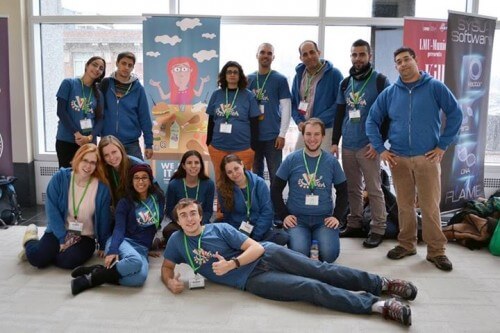The group developed a biotechnological device to detect harmful and allergenic components in food, water and more

The Technion team for the global iGEM competition in Boston returned to Israel with a gold medal. The group, which includes 11 students from the Technion and one student from Wicho College, entered the competition with an innovative development called Safie: a biotechnological device for detecting harmful and allergenic components in food, water and more. The device detects these substances - gluten, toxins, nuts, mercury, etc. - even when they are in low concentration. This is through E.coli bacteria that have been genetically engineered to emit green light in response to the presence of toxins or allergens.
"The idea is to give each person the opportunity to check independently and immediately what the content of their food is," says Rebecca Feldman, who heads the group. "The device itself is a kind of stick on which the group of bacteria suitable for the specified substance is placed, and we propose to engineer the bacteria so that even if only one of them detects the harmful substance, all of them will light up."
The iGEM competition was founded by MIT (Massachusetts Institute of Technology), and is designed to encourage students to independently promote a complete project in the field of synthetic biology. This is a scientific and engineering field, where interdisciplinary experiments are conducted to build biological machines that respond to their environment. The contestants - about 250 groups from around the world - are required to present their project in its entirety, including the development of the idea, economic model, proof of concept, etc.
Rebecca Feldman, born in the USA, heard about the competition in 2012, when the previous delegation from the Technion returned from iGEM with a gold medal. The medal was awarded to the group for developing the "Trojan horse" technique for transporting drugs in the body using viruses. Feldman was enthusiastic and asked to join the next expedition, scheduled for 2014. The group she established operates under the guidance of Professor Roi Amit from the Faculty of Biotechnology and Food Engineering and accompanied by Orna Attar, Lior Levy, Inbal Vaaknin, Michal Brunoser and Noa Katz. The trip to the competition was funded through donations from friends and family, as well as a crowdfunding project (headstart).
Regardless of the competition, the members of the group are leading a project entitled "Synthetic Biology in 3 Languages". This project, conducted in Hebrew, Arabic and English, aims to provide a common ground for conversation and work between Arabs and Jews through the world of synthetic biology and science. As part of the project, the members of the group conduct enrichment lectures and experience sessions in laboratory work, and participate as guest moderators in national science events. "Our emphasis is on mixed groups of Jewish and Arab youth," says Feldman, "from the belief that science crosses the boundaries of religion, culture and tradition."
